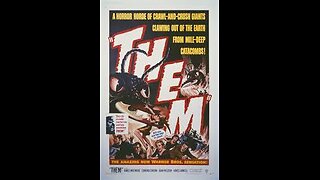Premium Only Content

Dear Murderer (1947) | A British crime film directed by Arthur Crabtree
"Dear Murderer" is a British crime film released in 1947, directed by Arthur Crabtree. The film falls within the film noir and crime thriller genres and is notable for its atmospheric storytelling and suspenseful narrative. Starring Eric Portman and Greta Gynt in lead roles, "Dear Murderer" explores themes of crime, deception, and the pursuit of justice.
Plot Summary:
The story revolves around Stephen Kean (Eric Portman), a successful and charming barrister in London. Kean is known for his skills in the courtroom, but behind the facade of respectability, he is engaged in an illicit affair with the glamorous nightclub singer Nora Bark (Greta Gynt).
Kean's life takes a dark turn when his wife, Evelyn (Hazel Court), discovers his infidelity and threatens to expose him. Faced with the potential ruin of his career and personal life, Kean resorts to a drastic solution—he decides to murder his wife.
The murder is carefully planned, and Kean meticulously covers his tracks. However, the investigation is led by Inspector Viner (Dennis Price), who becomes increasingly suspicious of Kean's involvement. As the detective delves deeper into the case, the layers of deception and intrigue unravel, revealing the dark secrets hidden beneath the surface of Kean's seemingly composed life.
The narrative unfolds as a cat-and-mouse game between Kean and Inspector Viner, with the barrister attempting to outwit the detective and avoid detection for his crime. The tension builds as the investigation closes in on the truth, leading to a gripping and suspenseful climax.
Key Themes:
1. Crime and Deception: The central theme of "Dear Murderer" revolves around the crime of murder and the layers of deception that characters employ to conceal their actions. The film explores the consequences of immoral choices and the lengths individuals will go to protect their secrets.
2. Legal and Moral Dilemmas: As a barrister, Kean is well-versed in legal matters, but the film raises questions about the moral and ethical aspects of his actions. The storyline delves into the tension between legal cunning and personal morality.
3. Film Noir Atmosphere: The film captures the atmospheric and stylistic elements of film noir, including shadowy cinematography, morally ambiguous characters, and a sense of impending doom. These elements contribute to the dark and suspenseful tone of the movie.
4. Investigation and Suspense: "Dear Murderer" incorporates elements of a police procedural as Inspector Viner investigates the crime. The suspense builds as the detective gets closer to uncovering the truth, creating a sense of anticipation throughout the film.
Production and Reception:
"Dear Murderer" is considered a well-crafted and engaging crime thriller of its time. Eric Portman's performance as the charismatic yet morally complex barrister received praise, and the film was generally well-received by audiences and critics alike.
While perhaps not as widely remembered as some other film noir classics, "Dear Murderer" is appreciated for its atmospheric storytelling, suspenseful narrative, and the exploration of moral dilemmas within the context of a crime thriller.
In summary, "Dear Murderer" is a British crime film that follows the story of a barrister who resorts to murder to protect his secrets. The film explores themes of crime, deception, and the moral consequences of one's actions, set against the backdrop of a suspenseful and atmospheric narrative.
-
 1:32:32
1:32:32
Classic Films & Movies Archive
7 days agoThem! (1954) | Directed by Gordon Douglas
147 -
 4:27:46
4:27:46
Nerdrotic
6 hours ago $26.43 earnedDaredevil Born Again REVIEW, Harry Potter Show DOA, DC HACKED! | Friday Night Tights 344 Paul Chato
83.1K27 -
 1:15:15
1:15:15
Glenn Greenwald
3 hours agoWeek in Review: Lee Fang and Leighton Woodhouse on Ukraine War and NYT Piece Revealing Tensions within Trump Admin; PLUS: Lee Fang Takes Audience Questions on DOGE and Big Tech | SYSTEM UPDATE #420
26.2K28 -
 1:03:30
1:03:30
Sarah Westall
5 hours agoMassive Government Overhaul: FBI, CIA, IRS and more to be Gutted w/ Sam Anthony
24.5K13 -
 DVR
DVR
IsaacButterfield
5 hours ago $1.35 earnedAustralia Under Attack | Trump's State of the Union | All LGBTQ Cast (W Guest Frenchy)
6.07K -
 1:23:37
1:23:37
Edge of Wonder
5 hours agoIs Your Car Collecting Your Biodata? Whistleblower Exposes Dark Agenda
21.5K2 -
 DVR
DVR
Quite Frankly
8 hours ago"News Round-Up, Celebrity Stories, Friday Extras" ft. J Gulinello 3/7/25
19.7K5 -
 55:49
55:49
LFA TV
1 day agoGermany Started Two World Wars and Now Wants Nuclear Weapons | TRUMPET DAILY 3.7.25 7PM
20.6K20 -
 1:34:38
1:34:38
2 MIKES LIVE
4 hours ago2 MIKES LIVE #189 Open Mike Friday (Sort Of)
16K -
 1:48:14
1:48:14
Right Side Broadcasting Network
12 hours agoLIVE REPLAY: President Trump Delivers Remarks at The White House Digital Assets Summit - 3/7/25
137K41